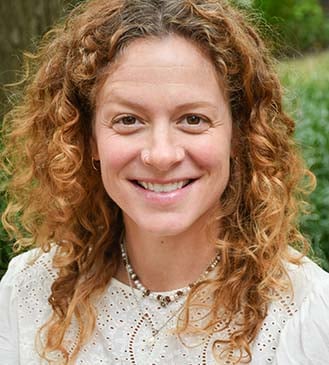
Emily Marble
Manager, Bus Planning, (Bus & Zero Emissions)
Emily has 16 years of professional consulting experience, having spent the last ten years working in the transportation industry. Following graduation from the University of Massachusetts (UMass), Amherst with a Bachelor of Science degree in Environmental Science, she began her career in environmental consulting. While working in the environmental services field, she also gained experience with occupational health and safety and industrial hygiene. This work was familiar as Emily was a work-study student for the Environmental Health and Safety (EHS) Manager in the UMass EH&S Department.
In 2015, Emily was granted an opportunity for a new career pathway in the transportation field. She began working as the document control coordinator for the Massachusetts Bay Transportation Authority’s (MBTA) Positive Train Control (PTC) Program. During her four and a half years supporting the PTC Program, Emily became the document control manager and worked directly with the MBTA, the contractor, and countless transportation consultants. In this role, Emily learned about the industry, the players, and became close with several Hatch colleagues. The rest is history. Emily joined Hatch in 2020 and in 2022 was welcomed into Hatch’s Bus and Zero Emissions group. This allowed Emily to mesh her environmental background with her transportation industry experience.
Currently, she is managing two contracts with the Massachusetts Department of Transportation (MassDOT); one multi-year contract with the Rail and Transit Division and a nine-month feasibility study for MassDOT’s Office of Transportation Planning. In addition, Emily is project manager on an engineering services contract with one of the Commonwealth’s Regional Transportation Authorities (RTAs), Cape Cod Regional Transit Authority (CCRTA).
Emily was recently featured in Busline Magazine as a Women to Recognize in Busing.
“Emily Marble is shaping the future of sustainable transit by leading zero-emissions bus projects, driving workforce development, and serving as a trusted voice for Regional Transit Authorities while explaining complex transition strategies to the public and media with clarity and confidence.”
Why do you believe in diversity and inclusion?
Diversity and inclusion are necessary for the proliferation, advancement, and betterment of the world. The sustainability of life (humankind, the environment, animals, etc.) is predicated on diversity. It is no different when thinking of a company. The success of a company depends on the diversity and contributions of its staff. I believe the greatest things can be achieved when you have a mix of people with varied backgrounds, professional experiences, life experiences, communication styles, and beliefs who can confidently and openly contribute and who feel empowered to do so.
What do you think we need to do as individuals to improve inclusivity?
To improve inclusivity in the workplace and in the broader context of our lives, I think it is important to practice and improve active listening skills. I also think it is necessary, in our fast-paced world, to slow down and notice the people around us, to show respect, empathy, and provide encouragement and support to everyone we interact with.
What does positive change mean to you?
Positive change means helping to make something better; it could be solving a technical problem; supporting a person through a difficult time or spreading kindness. Positive change can be large or small acts.
How are you changing the world?
I am changing the world by supporting carbon reduction in the transportation sector, a large contributor of greenhouse gas emissions.
What do you think are the toughest challenges facing your clients?
The toughest challenges facing my clients are the parallel pressures they deal with while maintaining transit service: budget cuts, operator shortages, ever-changing ridership needs, and political pressures. But, they are inspiring because, despite the challenges they face, they are the first to pilot new and innovative technologies and take risks to improve service offerings.
What are you most proud of?
I am proud of the work that Hatch’s Bus and Zero Emissions group is doing. We took on smaller projects that many may not have pursued. We did quality work and built strong relationships with our clients, and this has led to more work, and larger projects. This work has a positive impact on the environment and I'm proud to be a part of it.
What do you like most about working at Hatch? How do you think the Hatch culture is different from other companies?
I love my group, and the people with whom I work. I learn something from my colleagues every day. We take the time to understand our clients’ unique needs and create customized solutions.